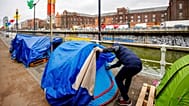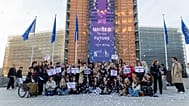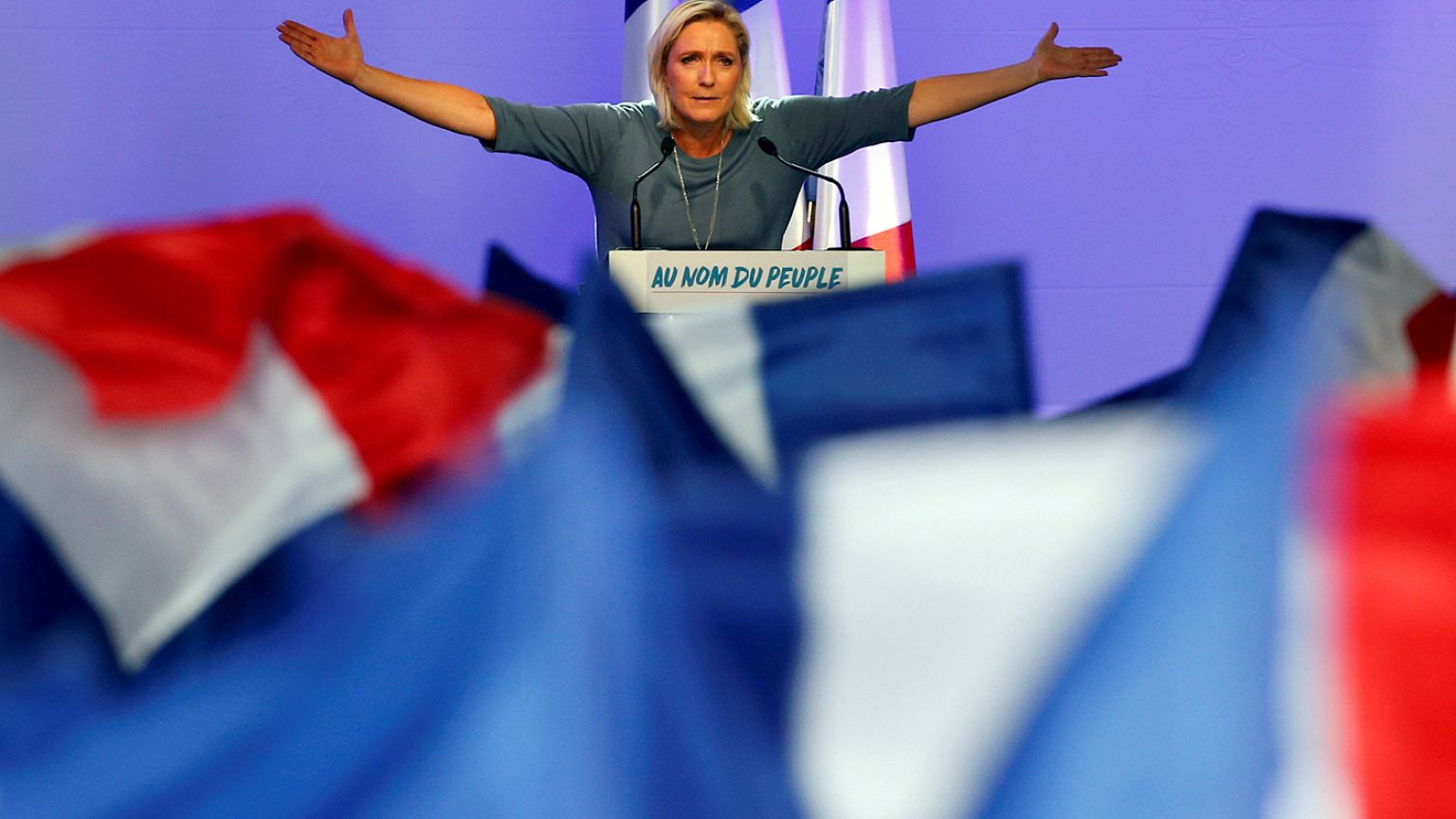Since the triumphs of Brexit and Trump, the Front National leader has been increasingly seen as a serious contender in the 2017 French presidential election.
This article has been updated to take account of Marine Le Pen’s presidential campaign launch in February 2017.
 ADVERTISEMENT
ADVERTISEMENT
 ADVERTISEMENT
ADVERTISEMENT
Donald Trump’s election to the White House set a wild American cat among a flock of flapping European pigeons.
Horrified EU leaders gritted their teeth as they tempered messages of congratulation with reminders about “values”. Rifts were exposed amid attempts to find a common response. There have been fears that Trump’s triumph can only sharpen populist claws in Europe.
In contrast to the cautious political mainstream, anti-establishment figures pounced on the US result with glee.
Félicitations au nouveau président des Etats-Unis Donald Trump et au peuple américain, libre ! MLP
— Marine Le Pen (@MLP_officiel) November 9, 2016
The French Front National (FN) leader was among the first to congratulate the US presidential winner and the “free” American people, quickly adding that the result was “good news” for France.
Three months later, she has expanded on her theme. “I said the evening of Trump’s election that this is not the end of the world, it’s the end of a world. The EU world is ultra-liberalism, savage globalisation, artificially created across nations. I believe that this world is dead,” she told BBC Radio.
Marine Le Pen has long been touted to reach the run-off of next spring’s presidential election, especially in the wake of several terror attacks carried out on French soil in the name of political Islam. The question that has been increasingly asked is whether she can actually win.
Victory for a contender from one of the European Union’s linchpin countries, who wants to see the break-up of the EU, could be a mortal blow to the bloc.
Soft but hard – and above all, sovereign
The Front National leader’s 144-point manifesto for the 2017 presidential election was published the day before Le Pen’s key speech in Lyon which effectively kicked off her campaign. As with her programme from the 2012 election, her rhetoric on familiar themes is arguably every bit as important in terms of attracting voters as the policy details themselves.
Her record on “un-demonising” the far-right party previously led by her father Jean-Marie Le Pen is well documented. Now, as if to distance herself further, even the family name has vanished. The new label – on her website, on the podium in Lyon – simply says “Marine 2017”.
At the same time, if anything, the rhetoric has hardened. Although the FN agenda has echoes of both political right and left – according to Le Pen it is neither – it strongly promotes traditional Front National themes: national sovereignty, law and order, anti-immigration, and anti-elites. “In the name of the people” is the slogan.
TRUMP: MARINE LE PEN SE SENT POUSSER DES AILES. Le dessin du Monde de ce jeudi 10 novembre. pic.twitter.com/BWhs6lLR6d
— PLANTU (@plantu) November 10, 2016
The people v the elites
This is the rallying cry of the FN leader – all the more so now the Trump tempest has blown in from the Atlantic, whipping up Brexit’s breeze.
In a key speech at Fréjus in the south of France last September, Marine Le Pen spoke repeatedly of “the people”: portraying essentially a French nation defenceless in the face of economic liberalism and multiculturalism imposed from abroad – especially the EU.
The message was repeated in Lyon, where she took world leaders to task over “unregulated globalisation”.
“They’ve made an ideology out of it. An economic globalism which rejects all limits, all regulation of globalisation, and which consequently weakens the immune defences of the nation state, dispossessing it of its constituent elements: borders, national currency, the authority of its laws and management of the economy, thus enabling another globalism to be born and to grow: Islamist fundamentalism,” she said.
At Fréjus in September, Marine Le Pen’s critics noted an absence of words such as “Islam” or “Islamist” from her rhetoric, commenting that her language spoke for itself: her supporters knew exactly what she meant when she spoke of “these people whose beliefs, values and practices are not ours, who don’t have a vocation to be in France”.
In Lyon in February, as in the FN’s presidential manifesto, Le Pen’s speech was peppered with references to “Islamist” and “Islamism” – which along with globalisation represent a “totalitarianism which threatens our country”.
Law and order v ‘permissiveness’
Included in the presidential manifesto are pledges to ban organisations and deport all foreigners linked to Islamist fundamentalists, close extremist mosques and stop their financing from abroad, ban the public financing of cults, and fight jihadist networks by stripping bi-nationals of their French citizenship and via deportations and preventative detention.
This week Le Pen visited three police stations in Paris suburbs, as officers faced accusations of brutality over the strong-armed arrest of a young man. Her move clearly differentiated her from President Hollande, who visited the man allegedly raped with a police baton.
Law and order pledges include providing 15,000 more police, targeting gang leaders, putting an end to “judicial permissiveness” via zero tolerance, stricter sentencing, more prison places and automatically deporting foreign offenders. A previous wish to reintroduce the death penalty has been transformed into a pledge to ensure life imprisonment is “real”.
Why Le Pen can win. An answer to a question you asked me once,
JohnRentoul</a> In <a href="https://twitter.com/TheNewEuropean">TheNewEuropean https://t.co/vLHJH3fVnY— MarionVan Renterghem (@MarionVanR) January 31, 2017
Immigration, multiculturalism and national identity
As in 2012, the FN’s manifesto contains proposals to cut legal immigration to 10,000 “entries” a year. Deportations are to become easier; obtaining aslyum, residency rights and French nationality, harder.
At Fréjus, Le Pen railed against “massive immigration”, linking it closely to the question of national identity. Immigration policy and multiculturalism had become dogmatic “religions”. The consequences of the latter, she said, could lead to “civil war between communities”. More than once she spoke of “one language, one culture” as crucial to human dignity within “one national community”.
In the newspaper Le Monde, historian Gregoire Kauffmann described Le Pen’s opposition to immigrants in the name of a homogenous nation as “a vision of a partitioned and rigid community”.
The FN too toxic for UKIP
If Le Pen’s language sounds reminiscent of supporters of Brexit, Britain’s own anti-establishment, anti-EU party has long distanced itself from the Front National. Although the French leader argues there is “not a hair’s breadth” between the two parties, UKIP criticises the FN’s stance on immigration.
“We are not going to welcome any more people, stop, we are full up!” Marine Le Pen said on British television in November.
Senior UKIP figure Suzanne Evans said she was “appalled”. “That is so far away from UKIP policy, it’s unimaginable,” she said in response, explaining that her party wanted to “welcome” migrants under a points-based system.
French Far-Right Leader Marine Le Pen Says She And Donald Trump Are Building “A New World” https://t.co/oIAlwA4ro6
— BuzzFeed News (@BuzzFeedNews) November 13, 2016
‘Economic patriotism’, ‘intelligent protectionism’
The Front National leader continues to cite the UK has having set the right example with the referendum vote to leave the European Union.
“With Brexit, people made the choice for border control, re-industrialisation, economic patriotism, intelligent protectionism. The United States has chosen the same by electing Trump. I’ve been pushing for this new world order for years,” she said on the BBC this week.
It has come to define her political discourse. Political divisions “no longer put the right and left in opposition, but patriots and globalists,” Le Pen argues.
Social and employment policy are thus presented in terms of promoting “patriotic” models. There are pledges to promote French business, to protect the economy where necessary from foreign investment and free it from “European constraints”, to impose an extra tax on the employment of foreign nationals.
Previous promises remain: to lower the retirement age to 60, reduce energy prices and taxes, and introduce trade barriers along with measures designed to help small rather than big business. The 35-hour week is sacrosanct, civil servants are to be protected.
However, in what has been seen as an attempt to appeal to more economically liberal elements of her party, wary of the left – the FN calls for businesses to be freed up from red tape, overtime to be exempted from tax.
For it has also been pointed out that the FN is not one homogenous block. “There are two Front Nationals: one in the north of France which is anti-religious, very socialist, quite leftist; and one in the south, which accepts the euro, which is – economically speaking – liberal, and Catholic. The only thing which helps them to stick together is the prospect of winning one day,” writer and economist Alain Minc has said.
There will be no President Le Pen | Catherine Fieschi https://t.co/jeJi7pt2oR
— Guardian news (@guardiannews) February 8, 2017
The EU in the firing line
Le Pen wants France to leave the EU’s Schengen zone, reintroduce national borders and boost customs controls. The most important pledge comes at the top of the list, as part of a bid to restore monetary, legislative, territorial and economic sovereignty: after a period of negotiation, to put France’s membership of the EU to a referendum.
“The European Union is a failure. It hasn’t kept any of its promises, especially over prosperity and security,” she told the party faithful in Lyon.
There are fewer details in her programme over what sort of model would replace it: there is no mention for example, of a previous idea for a pan-European partnership of nation states including Russia.
Likewise, Le Pen has previously been more forthcoming over proposals to reintroduce the French franc. In the 2017 manifesto it is covered in pledge number 35: the “reinstatement of the national currency” dropped in as part of the plan to boost French competitiveness.
For journalist Arnaud Leparmentier writing in the newspaper Le Monde (paywall), this proposal alone is worthy of virtually the entire article, so catastrophic would be the consequences especially for the poor, he argues. The result would be panicking financial markets and devaluation – with the French rushing to open accounts abroad and “heaping euros under the mattress as they do with dollars in latin America”.
Vive #TRUMP ! La dédiabolisation est une foutaise et une impasse. Les peuples ont besoin de vérité et de courage. Bravo l’Amérique !
— Jean-Marie Le Pen (@lepenjm) November 9, 2016
Fresh air – or foul stench?
As the 2017 presidential election approaches, the French media have been debating how to treat the Front National. Some fret that the reluctance of mainstream broadcasters to give the FN a platform will only alienate voters further. Le Monde on the other hand refuses to report Marine Le Pen’s message without thorough scrutiny.
“She shares the same obsessions (as her father): those of an organic nation on the point of sinking because it is gnawed away at by an internal evil – immigration – threatened by an external enemy – Europe – and betrayed by its elites,” the paper said in an editorial in November.
For many, the Front National remains firmly anchored on the far-right: xenophobic, authoritarian, not so much modernised as deodourised – and France still needs to hold its nose.














